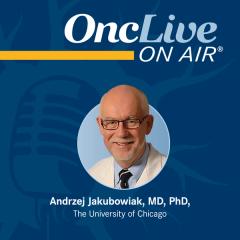
Dr. Jakubowiak on Initial Efficacy Data From the ATLAS Trial in Multiple Myeloma

Andrzej Jakubowiak, MD, PhD, discusses initial efficacy results from the phase 3 ATLAS trial in multiple myeloma.
Episodes in this series

Andrzej Jakubowiak, MD, PhD, director, Myeloma Program, University of Chicago Medicine, discusses initial efficacy results from the phase 3 ATLAS trial (NCT02659293) in multiple myeloma.
The phase 3 ATLAS trial compared maintenance therapy with lenalidomide (Revlimid) carfilzomib (Kyprolis) and dexamethasone (KRd) with standard-of-care (SOC) lenalidomide alone in patients with newly diagnosed multiple myeloma who completed autologous stem cell transplant (ASCT) after induction therapy.
The study’s primary end point was progression-free survival (PFS), while secondary endpoints included rate of minimal residual disease (MRD) at 6, 12, 18, 24, and 36 months post-randomization, correlation of MRD with PFS, duration of MRD, depth of esponse, improvement in the depth of response at 6 and 12 months, overall survival (OS), and safety, Jakubowiak begins. Statistical modelling for the ATLAS trial was based on historical data from the CALGB-100104 trial NCT00114101) and the phase 2 FORTE trial (NCT02203643) of KRd prior to or after ASCT.
zAn unplanned interim analysis of the trial occurred after 61% of the 96 expected events occurred at a median follow-up of 33.8 months. Initial findings showed that maintenance KRd significantly improved median PFS vs lenalidomide monotherapy but did not affect OS in this population, Jakubowiak continues. Additionally, MRD negativity correlated with increased PFS in the KRd arm. Notably, this difference in PFS met the threshold required to demonstrate statistical significance, Jakubowiak explains.
Final analysis is planned to confirm these findings. However, preliminary survival results signal that post-transplant KRd could be a viable alternative to the current SOC, Jakubowiak concludes.










































